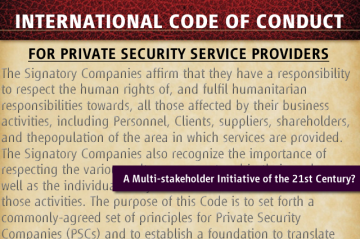Five Years On - The UN Guiding Principles in Kenya, a Three Legged Stool
On June 16th 2011, the UN Human Rights Council unanimously endorsed the UN Guiding Principles on Business & Human Rights. The Guiding Principles were unprecedented on many levels, including by reaffirming and clarifying state duties to protect...
16 June 2016 | Commentary
Commentary by Rose Kimotho
On International Human Rights Defenders’ Day
International human rights defenders’ day, which we observe today, is a moment of sobering reflection. Peaceful, non-violent human rights defenders are being prosecuted, convicted, and jailed in some cases, and intimidated, tortured, and sometimes...
09 December 2015 | Commentary
Commentary by Salil Tripathi, Senior Advisor, Global Issues, IHRB
Investment in Africa: Thinking Beyond Stereotypes
This week President Obama will host the US-Africa Leadership Summit, a gathering of 51 Heads of State from across Africa.
The meeting in Washington, DC should discuss the kind of investments that not only promote economic growth, but that also help...
03 August 2014 | Commentary
Commentary by Motoko Aizawa John Ruggie, Patron Emeritus, IHRB; Author, UN Guiding Principles on Business & Human Rights
Bringing the Business and Human Rights Agenda to Higher Education in Africa
Earlier this month the European Union announced plans aimed at limiting global trade in minerals mined in conflict zones. While the goal of the new initiative is laudable, the approach being proposed – essentially a voluntary reporting scheme – is...
08 April 2014 | Commentary
Commentary by Masha Baraza
Kenya’s Emerging Natural Resources Sector: Getting it Right
Kenya is the latest country to discover oil and gas reserves with potential for commercial production. Interestingly, Kenya has been exploring for oil since the 1950’s but strong interest only took hold around 2000 after the completion of a national...
05 September 2013 | Commentary
What Should Companies do when States Offer Prime Land on a Platter?
This op-Ed was originally published on TheGuardian.com.
Companies investing in land in Africa and elsewhere need guidelines to ensure the human rights and dignity of local communities are protected
During a recent visit to Kampala, Uganda, we...
06 May 2012 | Commentary
Commentary by Wambui Kimathi Salil Tripathi, Senior Advisor, Global Issues, IHRB
What Does Water for All in Kenya imply for Business?
Kenya, in addition to being a signatory to the International Covenant on Economic Social and Cultural Rights has a new constitution, which expressly recognizes the right to water. Article 43 (1) (d) provides that every person has a right to clean...
22 March 2011 | Commentary
Commentary by Maina Mutuaruhiu
Conflict no excuse for business to act irresponsibly
As violence in Libya continues, tens of thousands of people of different nationalities, many of them migrant workers from countries ranging from China to India, Ethiopia to Nigeria, await ferries that can take them to safety across the...
15 March 2011 | Commentary
Commentary by Mary Robinson, Chair, The Elders; Patron, IHRB
Land, Water and Food: Advancing Human Rights Due Diligence
Earlier this month, the Institute for Human Rights and Business (IHRB) in partnership with the Kenya National Commission on Human Rights (KNCHR) brought together representatives from governments, National Human Rights Institutions (NHRIs) (Uganda,...
28 February 2011 | Commentary
Commentary by Wambui Kimathi
International Code of Conduct for Private Security Providers
Last week in Geneva, nearly 50 global private security firms came together to sign an International Code of Conduct (ICoC) with the objective of strengthening respect for human rights and humanitarian law within their operations. In addition to...
24 November 2010 | Commentary
Commentary by Nils Rosemann, Human Security and Business Desk, Swiss Federal Department of Foreign Affairs
Have the Voluntary Principles Realised Their Full Potential?
Extractive industries have little choice but to operate where they find resources. As a result, they may find themselves in conflict zones, facing human rights abuses taking place in their area of operations. Many have argued that since these abuses...
17 March 2010 | Commentary
Commentary by Salil Tripathi, Senior Advisor, Global Issues, IHRB















Home Government Incentives Toward Responsible Business Conduct
The ‘governance gap’- the gap between where law extends compared to where business activity goes - was a driving force behind the creation of the UN ‘Protect, Respect, Remedy’ Framework and Guiding Principles on Business and Human Rights (UN Guiding...
22 March 2017 | Commentary
Commentary by Margaret Wachenfeld, IHRB Senior Research Fellow, Managing Director, Themis Research